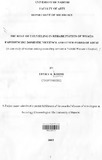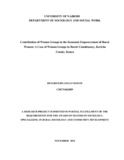Assessing the Contributions of the Women’s Movements & Women’s Self-Mobilization, to Women’s Economic Empowerment in Kenya Between 1963 and 2010
Date
2023Author
Ngunjiri, Margaret Wanjiku
Birech, Jeniffer
Muleka, Joseph
Type
Technical ReportLanguage
enMetadata
Show full item recordAbstract
This study focused on Women’s Economic Empowerment (WEE) in select counties in Kenya. These were Busia, Kakamega, and Kisumu in the Western region; Kajiado, Nakuru and Baringo in the Rift Valley region; Nyeri, Muranga, and Kiambu in the Central region; Nairobi region; Machakos, Kitui, and Makueni in the Eastern region; and Kwale, Mombasa and Kilifi in the Coast region. The research aimed at evaluating the contributions of the women’s movement and self-mobilization, to WEE in Kenya between 1963 and 2010, with the following specific objectives:
1. To map out a historical perspective on the contribution made by grassroots women’s groups and associations to WEE, between 1963 and 1975 which are the initial years of Kenya’s independence;
2. To examine the contribution of grassroots women’s groups and associations to WEE between 1963 – 1976, and 1976 – 1997 when the affirmative action fund started;
3. To establish the extent to which the national women’s movement influenced national policies on WEE between 1990 to date and lessons learned, including those around women’s care work, and
4. To establish what strategies work in women’s self-mobilization for WEE that can be scaled up to similar
contexts and inform policy dialogue.
The study adopted a predominantly qualitative research approach in its design of data collection, synthesis and analysis. The concept of women’s self-mobilization was measured using the Feminist Mobilization Index (FMI). The research also used the Women’s Empowerment in Agriculture Index (WEAI) which was used to assess women’s collective, instrumental and intrinsic agency. Besides, Sarah Longwe’s Women’s Empowerment model was used in combination with the WEAI to analyze various aspects of women’s empowerment that the feminist organizing efforts sought to achieve.
The overall question that the study sought to answer was: To what extent has selfmobilization by the women’s movement in Kenya resulted in Women’s Economic Empowerment?
The study used the FMI to assess the existence of the women’s movement, its dynamics and strength as well as the autonomy in the context of the political and economic environment in post-independence and subsequent spells that saw government involvement in women’s empowerment.
Sponsorhip
Bill & Mellinda Gates FoundationPublisher
UoN, AWSC, Women’s Economic Empowerment Hub
Description
Technical Report
Rights
Attribution-NonCommercial-NoDerivs 3.0 United StatesUsage Rights
http://creativecommons.org/licenses/by-nc-nd/3.0/us/Collections
The following license files are associated with this item:
Except where otherwise noted, this item's license is described as Attribution-NonCommercial-NoDerivs 3.0 United States
Related items
Showing items related by title, author, creator and subject.
-
'The development of Women's Studies in Kenya' IN Women's Studies Around the World.Women's Press
Chesaina, Ciarunji (Department of Language and Literature, 1994) -
The role of counseling in rehabilitation of women experiencing domestic violence and other forms of abuse (A case study of women seeking counseling services at Nairobi Women's Hospital)
Kirimi, Eunice K (University of Nairobi;Department of Sociology, 2005)This study aimed at investigating the role of counseling in rehabilitating women experiencing domestic violence at the Nairobi Women's Hospital. The study focused on the type of violence that they experienced, the ... -
Contribution of Women Groups in the Economic Empowerment of Rural Women: a Case of Women Groups in Bureti Constituency, Kericho County, Kenya
Koech, Benard K (University of Nairobi, 2014-11)Women groups play an important role in enabling rural women to achieve economic empowerment through poverty alleviation. The general aim of this study was to determine the contribution of women groups in the empowerment ...




